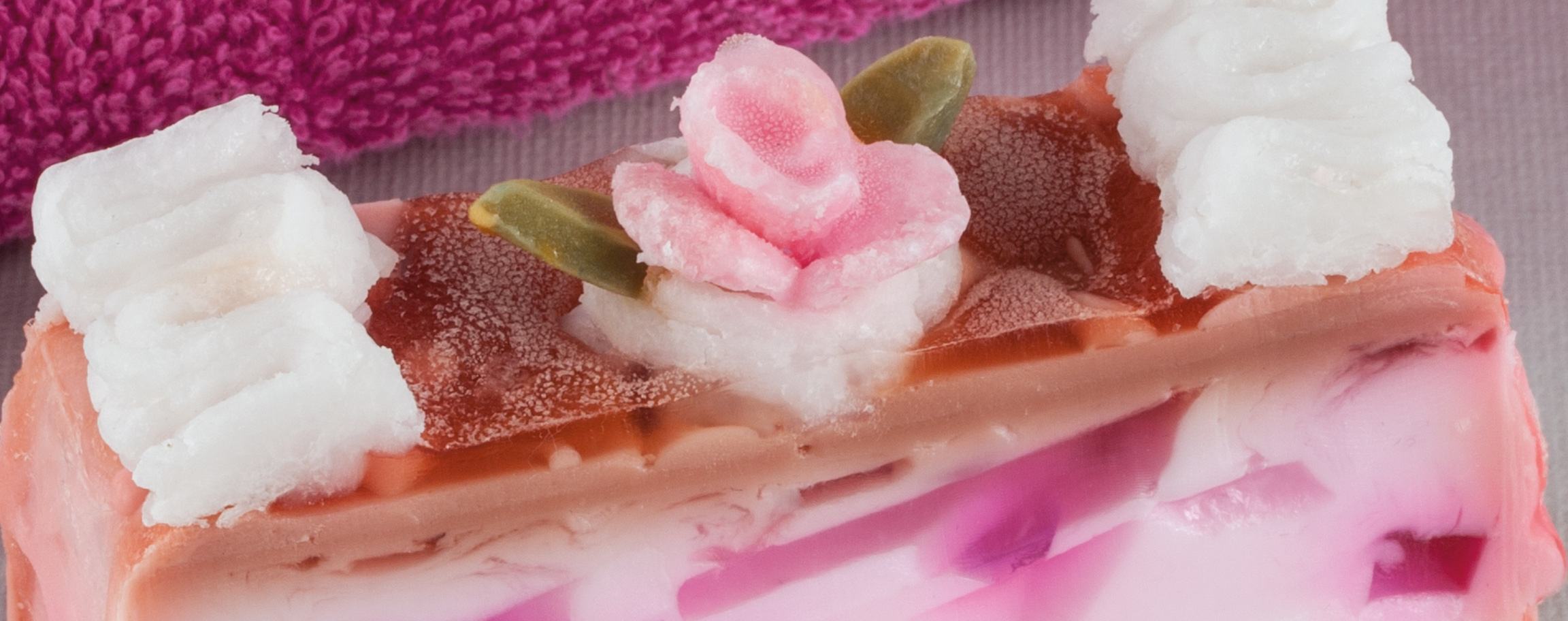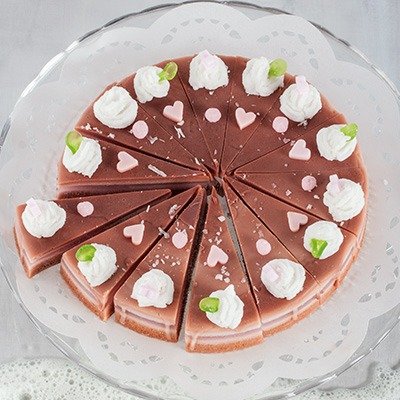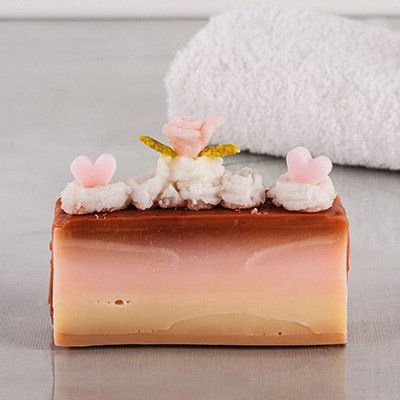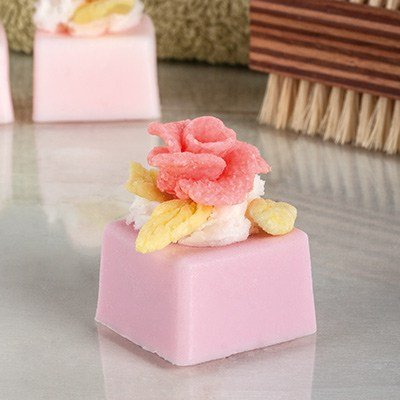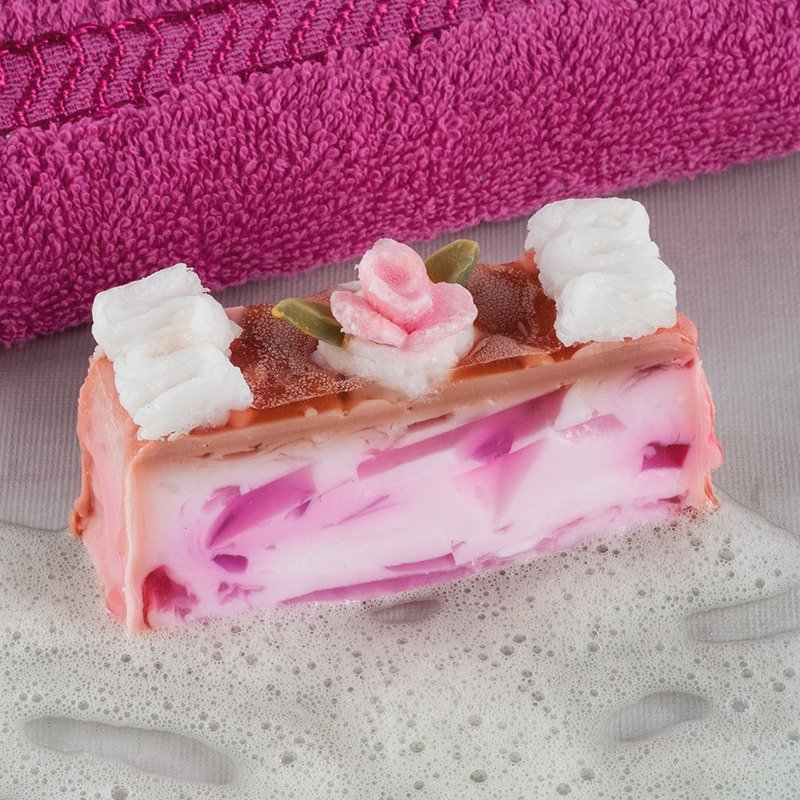
Instructions in 20 steps The pink piece of cake made of soap is pretty lavish and delicate. The "fruit pieces" are made from soap scraps that you have to shape. At the end, decorate it with the kneading-soap.
Besides the articles listed below, you also need: Kitchen scales, pot, melting pot, small plastic container, stirrers, kettle, cooking oil, craft stick, plastic lid or alum.foil
And this is how it works: 1 ![]()

Step 1
Melt the creative-soap in a water-bath on the stove (max. 60° - do not boil).2 ![]()

Step 2
After the complete melting, you can stir the desired colour and/or fragrance oil in the liquid soap. Therefore, use a wooden spatula or a teaspoon. Pour it dropwise.3 ![]()

Step 3
Prepare a soap sheet about 1.5-2cm thick out of the opaque soap and the purple soap dye (see instructions for soap sheets). Cut small irregular pieces out of the hardened dyed opaque & transparent soap sheets by means of a knife. Place these pieces in the cube-shaped soap casting mould.4 ![]()

Step 4
Pour carefully the white opaque soap over the pieces in the soap casting mould. But you should pay attention not to pour it in one quick motion, but rather slowly throughout the casting mould by leaving 5mm empty from the upper border.5 ![]()

Step 5
Before demoulding the cast soap, let it cool down thoroughly (at best one day).6 ![]()

Step 6
Pour the chocolate gaze over the demoulded soap bar (see instructions for glaze). Make a cream rosette (see instructions for cream rosette) and a little rose (see instructions for the rose out of kneading-soap) out of the kneading-soap.7 ![]()

Step 7
Push the little rose into the still wet cream rosette and fix the cream rosette with some liquid soap onto your cake.8 ![]()

Step 8
Cut the soap bar into 4-5 slices (at best by means of a japanese spatula that is available in your local DIY store).9 ![]()

Step 9: Cake glaze
Melt the creative-soap in a water-bath on the stove (max. 60° - do not boil). After the complete melting, you can stir the nougat colour in the liquid soap. Therefore, use a wooden spatula or a teaspoon. Pour it dropwise.10 ![]()

Step 10: Cream rosette
Mix the kneading-soap with hot water and the cooking oil, for e.g. 50g of the kneading-soap with 20ml of hot water and about 5ml of the cooking oil.11 ![]()

Step 11
Stir this mixture with a craft stick and let it rest for 10 minutes. Then knead the mixture well again. Build together a pastry bag (without a bag) and fill it with some kneading-soap.12 ![]()

Step 12
Push the kneading-soap with a finger through the tip and shape at once the pushed out mixture.13 ![]()

Step 13: Rose out of kneading-soap
Mix the kneading-soap with hot water, the cooking oil and the soap dye.14 ![]()

Step 14
Stir this mixture with a craft stick and let it rest for 10 minutes. Then knead the mixture well again.15 ![]()

Step 15
Take out from the mixture a ball 0.50 up to 1cm big (according the size of the rose) and shape a rose petal out of this ball that you should bend carefully to the middle of the rose. You can fix small cracks by a wet finger.16 ![]()

Step 16
Now, shape the next rose petal in the same way and lay it onto the first one. Repeat the whole process with the next rose petals and lay them around. Bend a bit outwards the upper border of each flower petal.17 ![]()

Step 17: Soap sheet
Melt the creative-soap in a water-bath on the stove (max. 60° - do not boil).18 ![]()

Step 18
After the complete melting, you can stir the colour in the liquid soap. Therefore, use a wooden spatula or a teaspoon. Pour it dropwise.19 ![]()

Step 19
Pour it dropwise.20 ![]()

Step 20
Pour the melted soap onto a flat surface such as for e.g. a small lid or some aluminum foil.Additional info: The soap dries or rather carries on ripening and becomes thereby firmer (two up to three weeks). Depending on the temperature and airiness, the soap can perspire. We recommend therefore to wrap the soap after its demoulding in a floral gift-foil (item no.81 489 00). Clean the soap casting mould and the pots with hot water.














